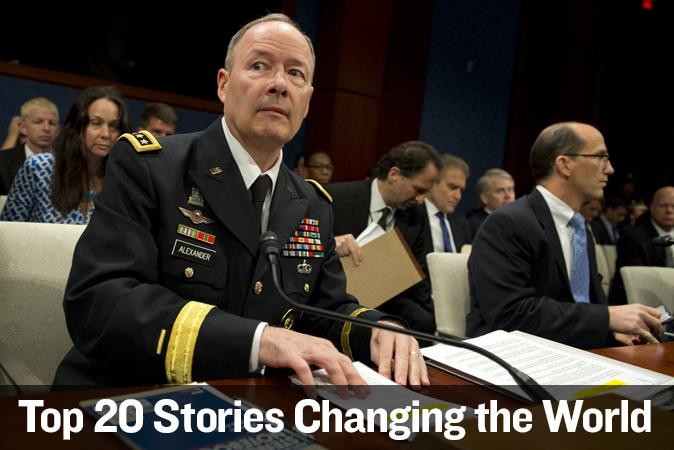As part of our comprehensive year-end coverage, Epoch Times editors have made a selection of stories that we believe are significantly changing the world. The stories are ranked from No. 20, having the least impact, to No. 1—our top pick.
Each story is based on a major news story of 2013 that will have lasting impact into 2014 and beyond. Check back daily as we countdown to Jan. 1st and our New Year.
A global discussion on the balance between national security and electronic privacy was started by Edward Snowden, a former contractor of the National Security Agency (NSA). Documents he stole from the NSA expose spying on politicians, databases collected from civilian phone calls, and details on spying programs of other countries.
Snowden provided at least 200,000 classified documents to Glenn Greenwald, a journalist at the Guardian. The first article discussing the leaks was published on May 20, after Snowden had fled to Hong Kong.
The leaks are mainly limited to activities of the NSA, and equivalent departments of Canada, the U.K., Australia, and New Zealand. The countries are part of the United States of America Agreement (UKUSA) signals intelligence-sharing program, also called “Five Eyes.” The leaks also exposed spying programs of other countries, including France and Germany.
In 2014, the leaks are expected to continue. Greenwald announced in October he would leave the Guardian and form his own website to release the files.
Leaked documents about NSA spying on foreign leaders, including German Chancellor Angela Merkel, have damaged international relations. In the coming year, the United States will need to do some repair work.
Two bills have also been proposed, one in the U.S. House and one in the Senate that would reduce the NSA’s reach.
Defenders of the NSA point out that: all nations spy; most of the surveillance is actually data mining, which does not single out individuals; and the purpose of the surveillance is to stop terrorism and monitor foreign intelligence agents, missions at which the NSA has had some success.
Many U.S. leaders, including NSA Director Gen. Keith Alexander, have accused the press of inaccurate reporting on the documents. During an Oct. 29 hearing, Alexander said, “They, and the person who stole the classified data, did not understand what they were looking at.”





